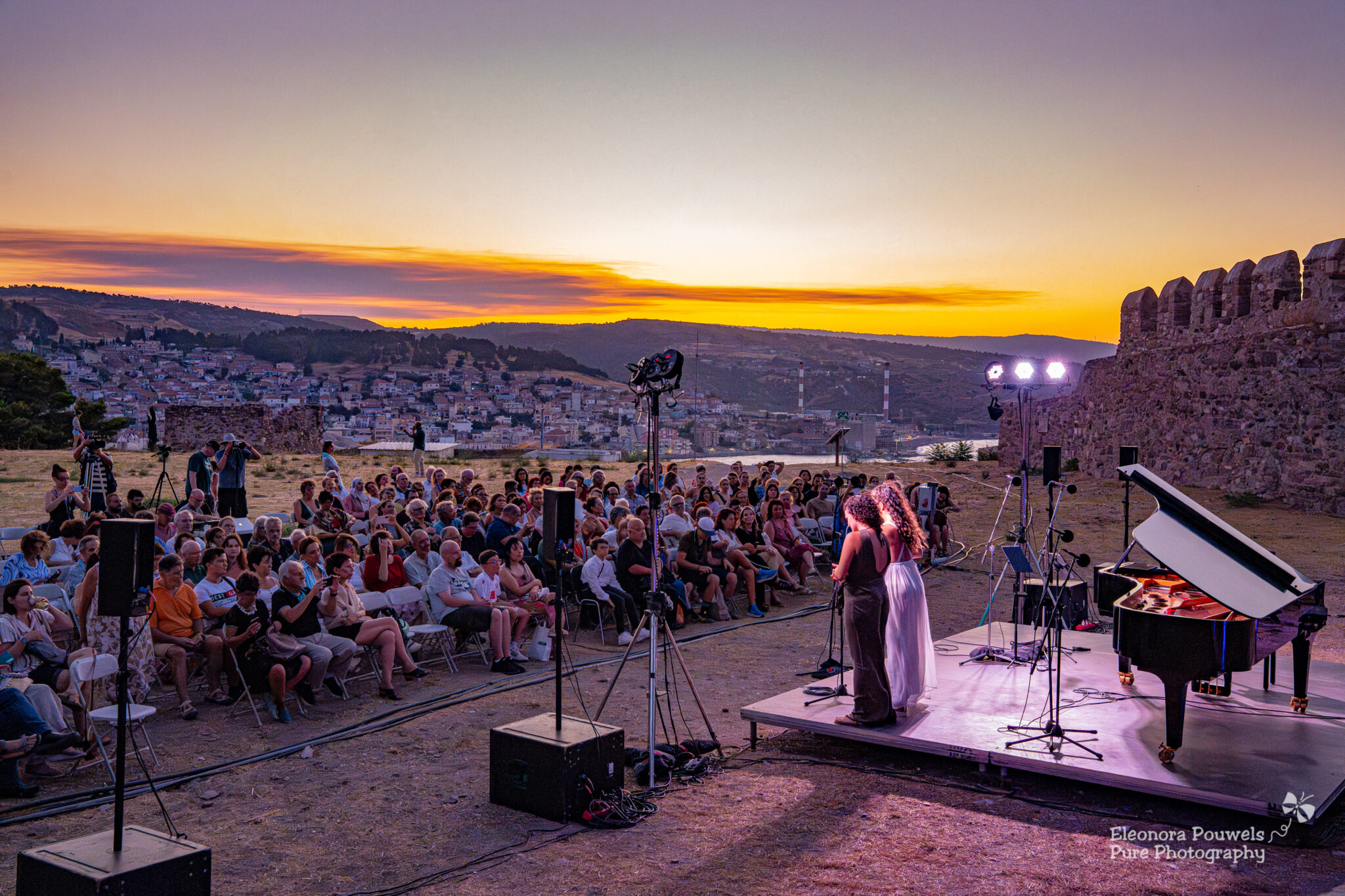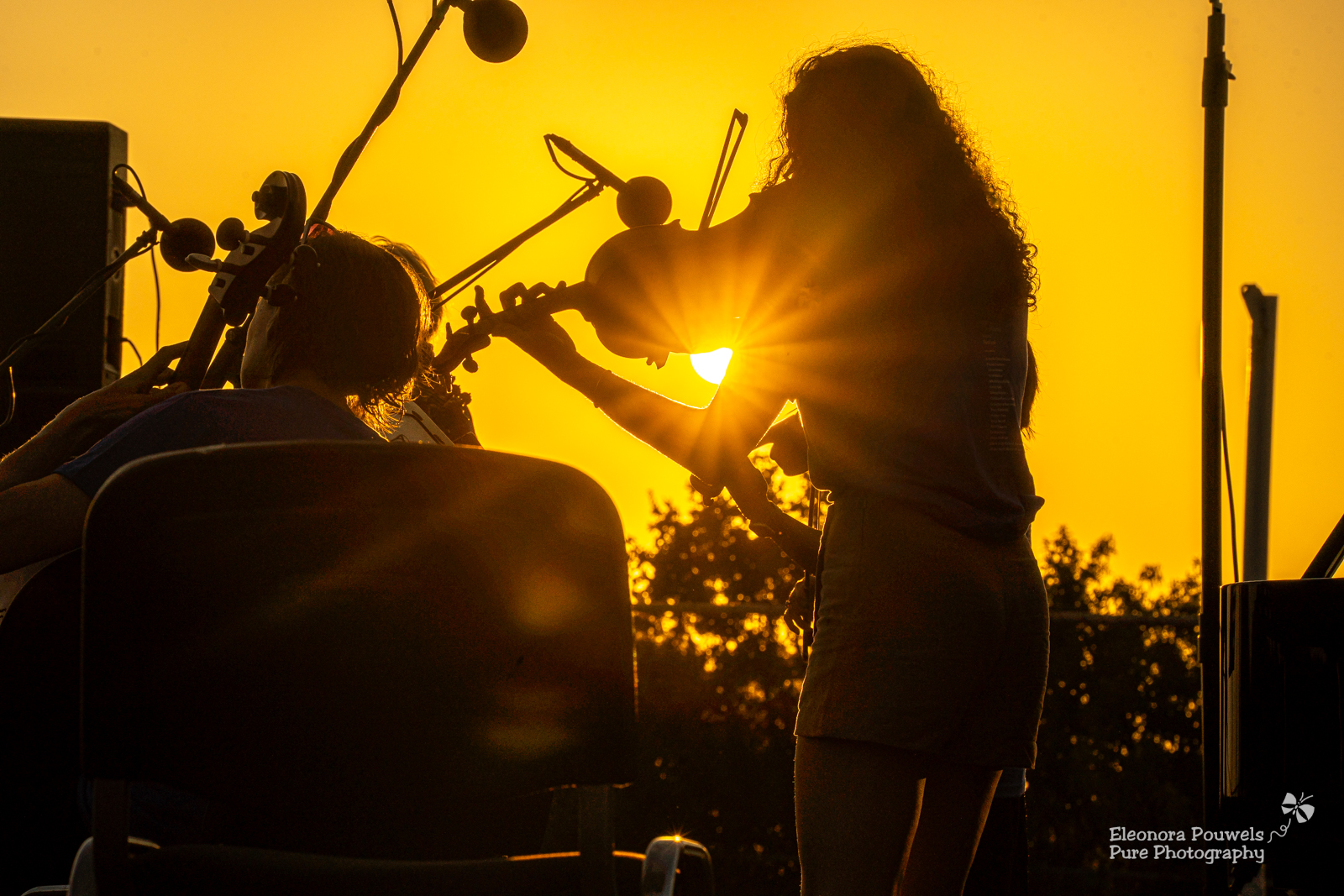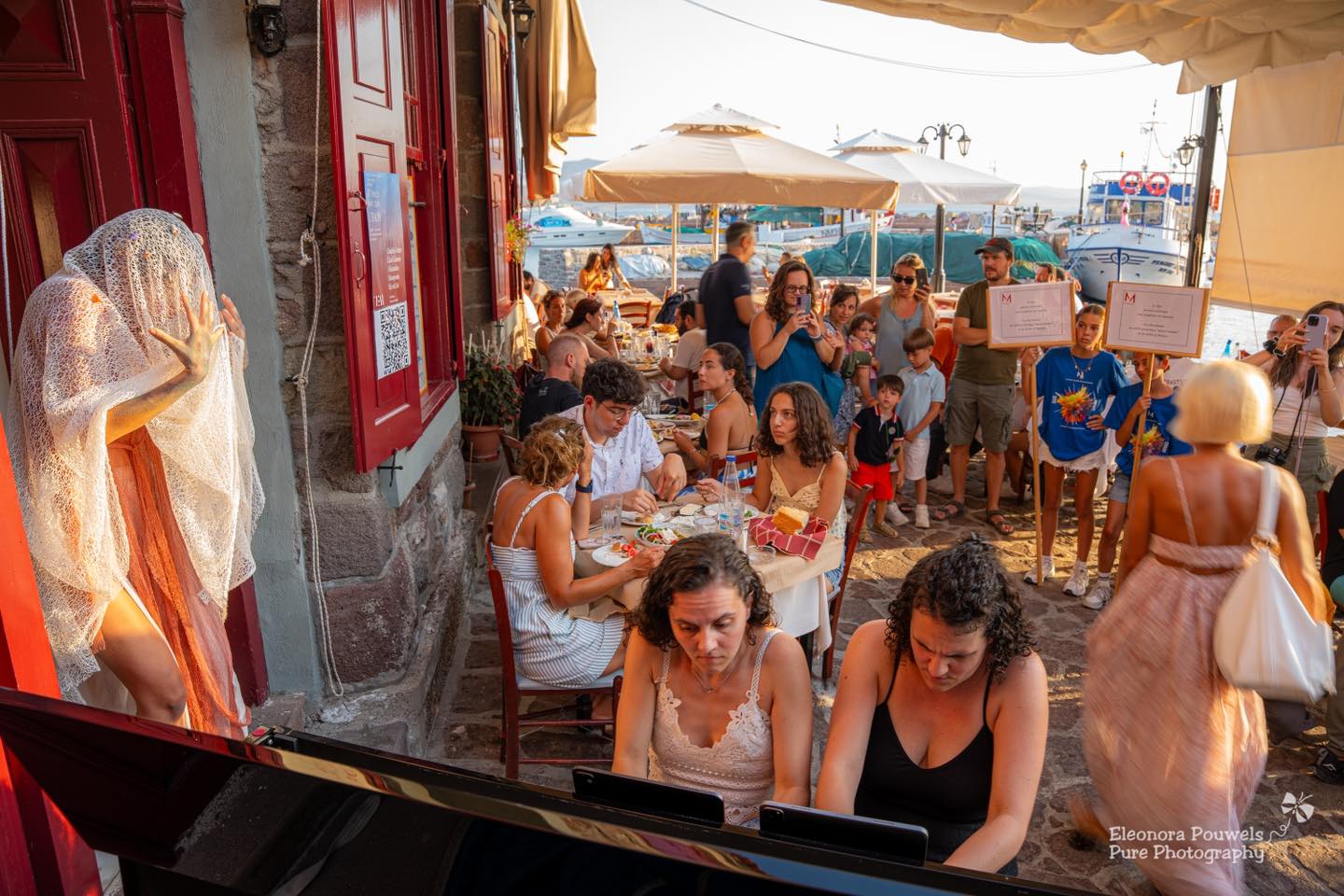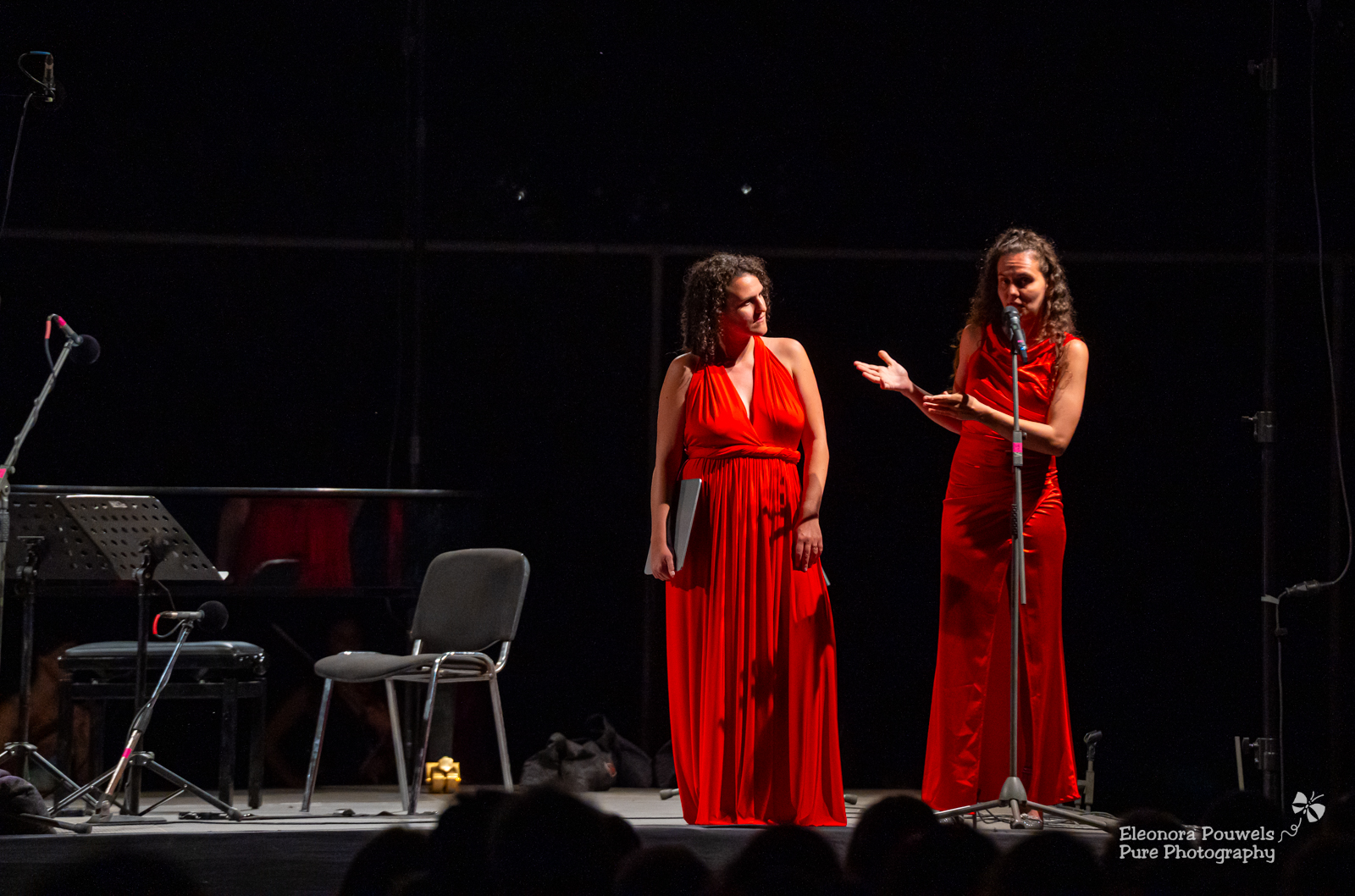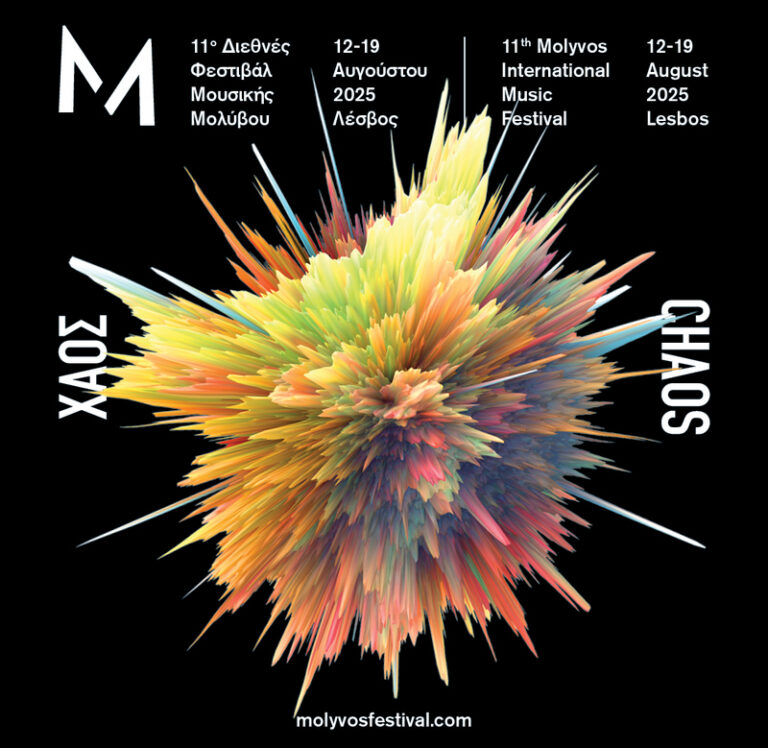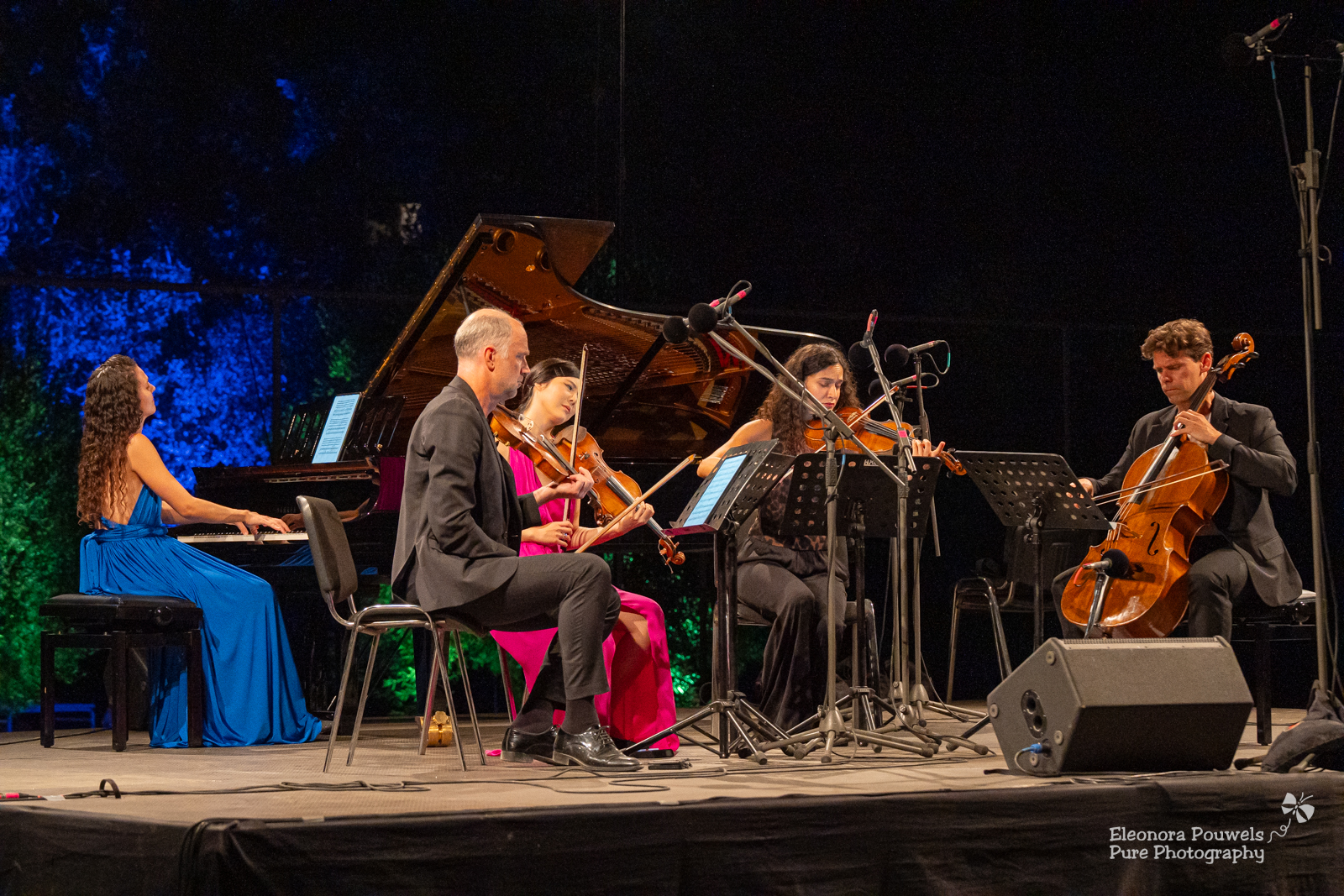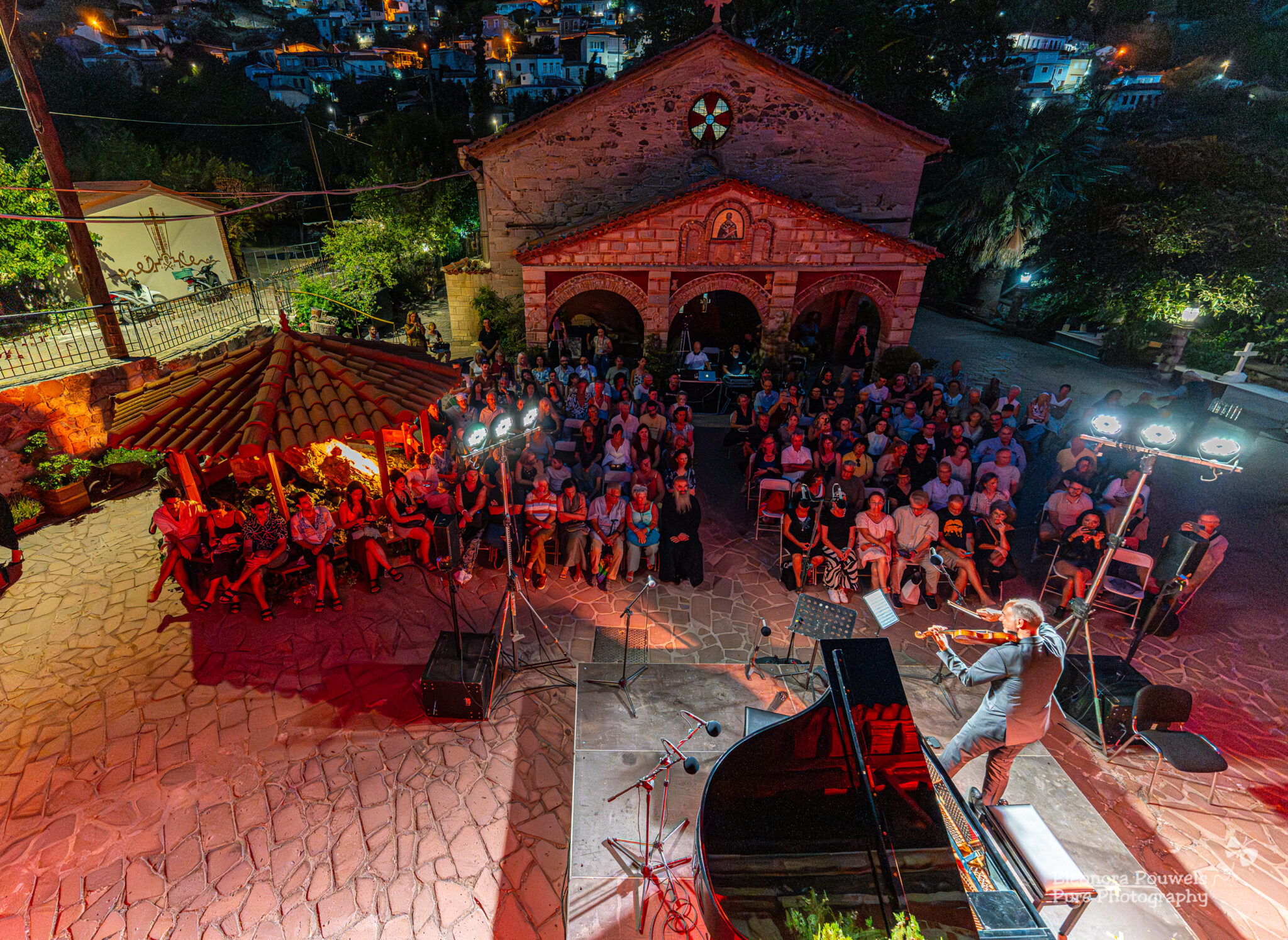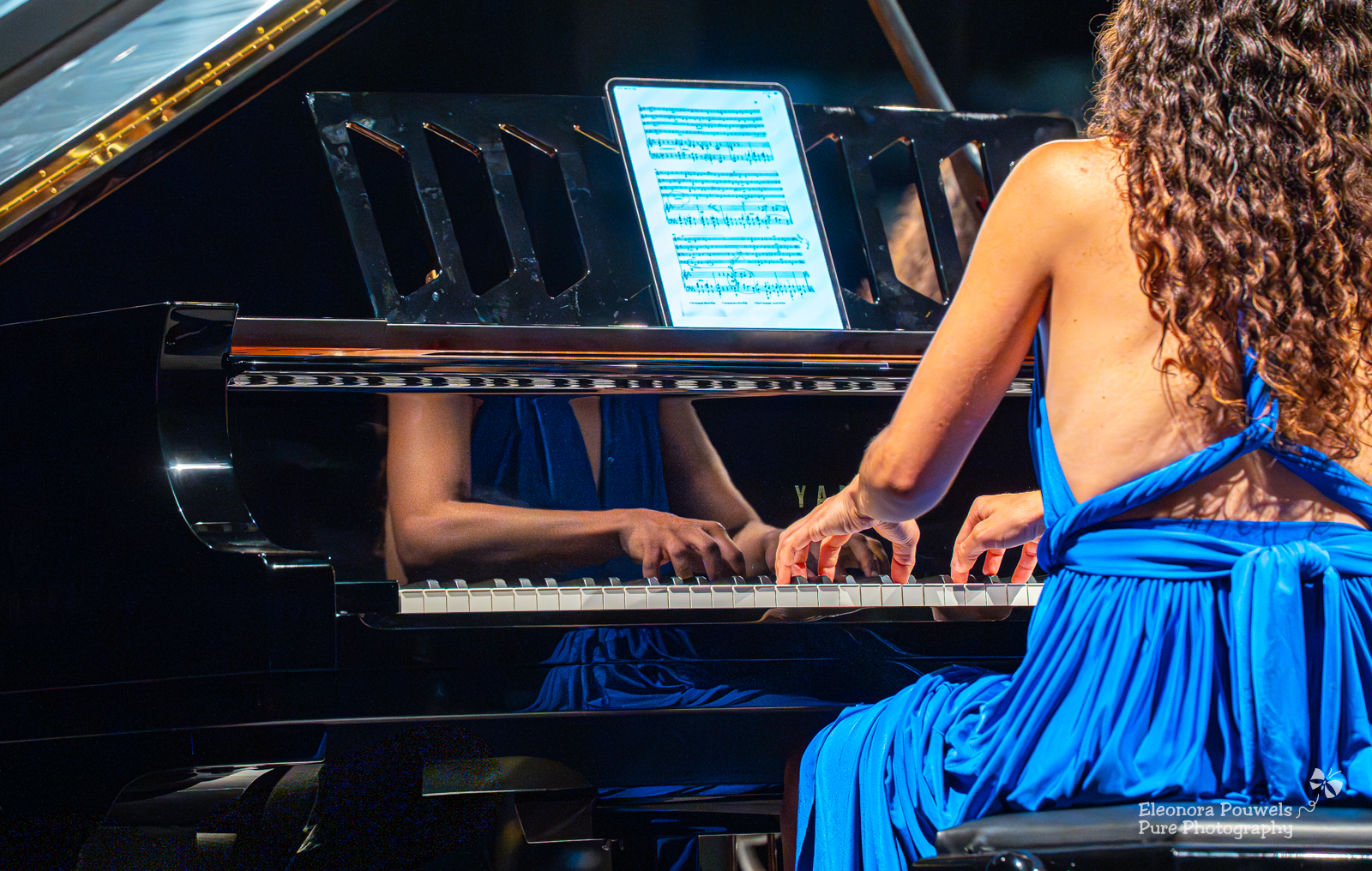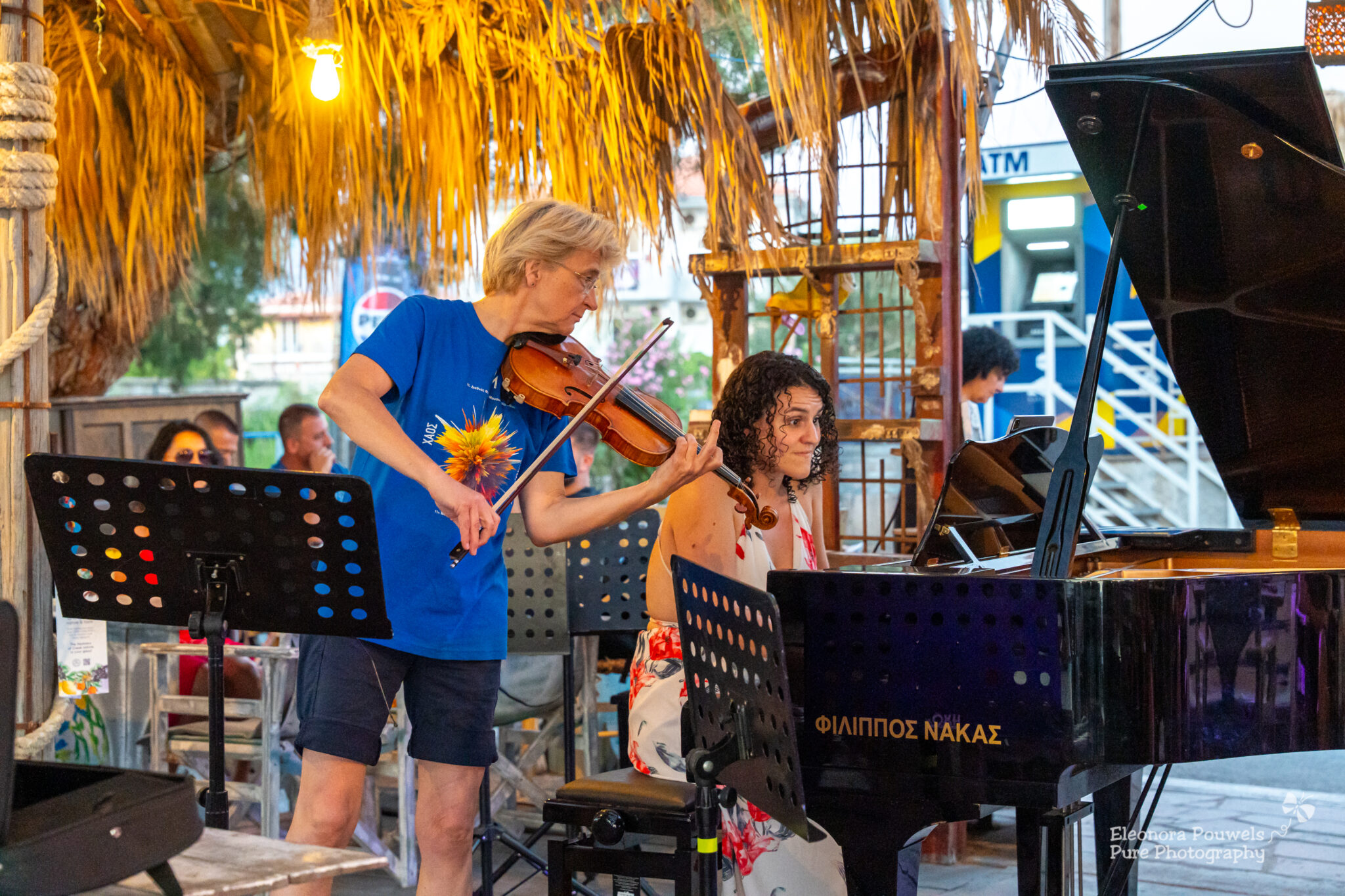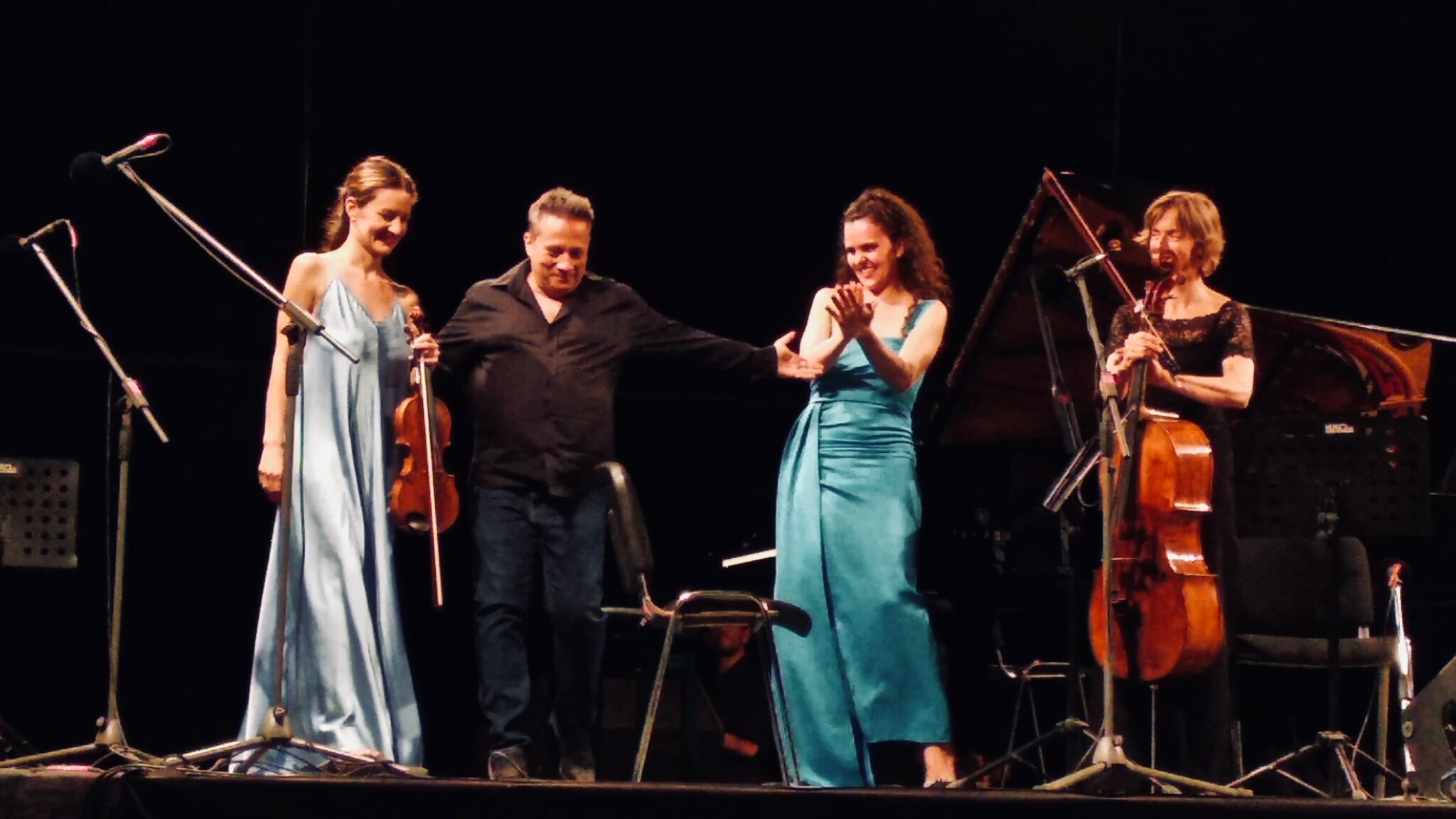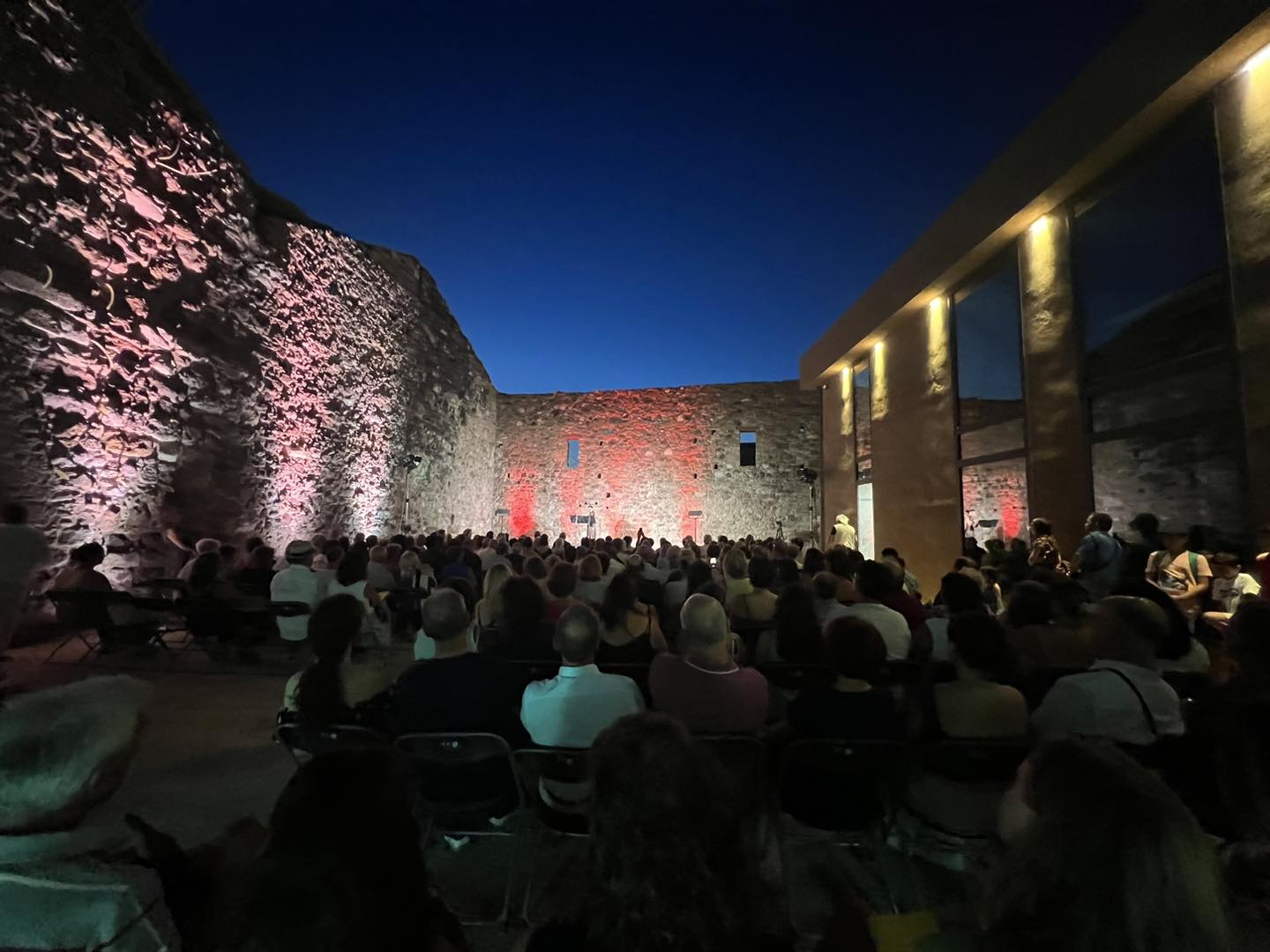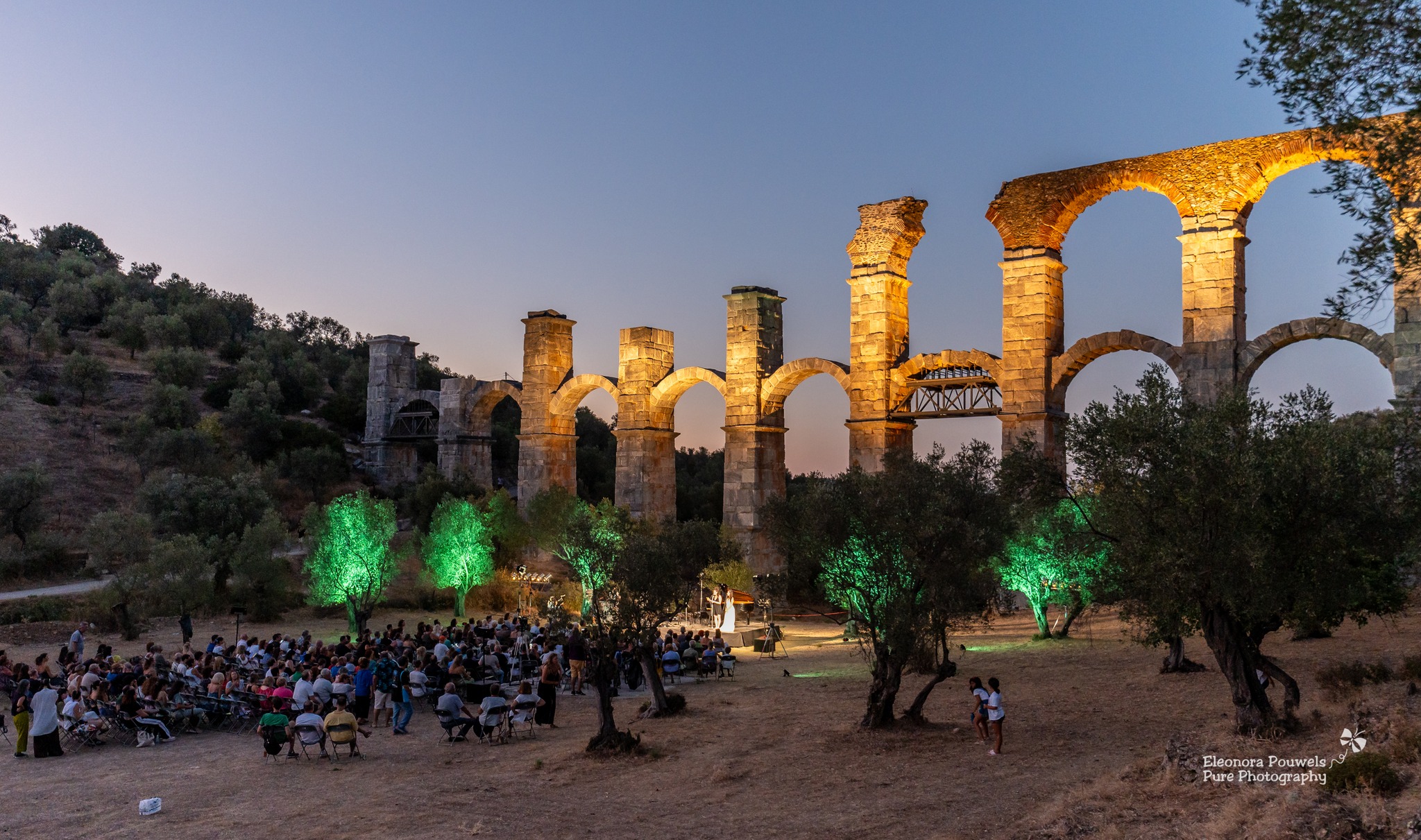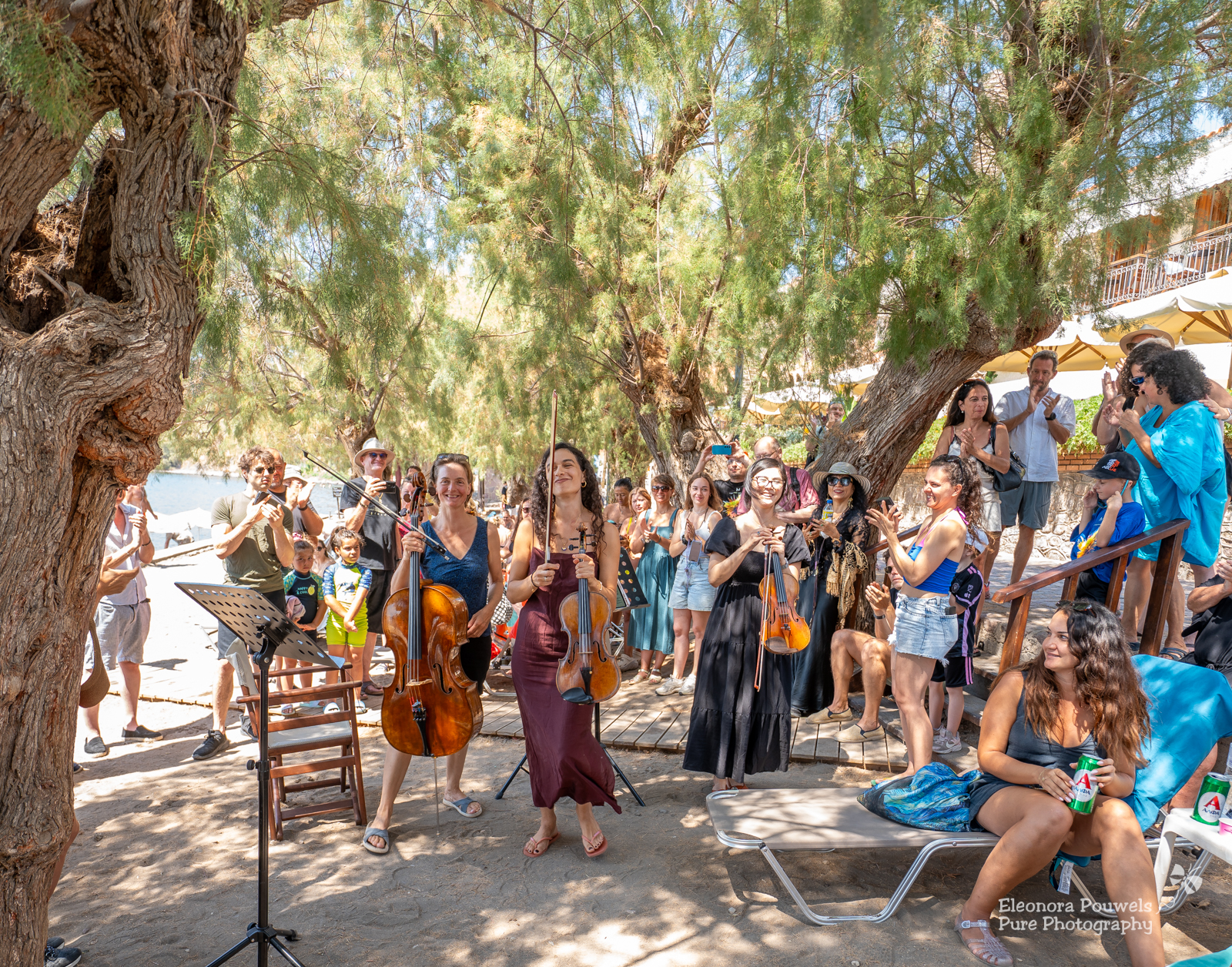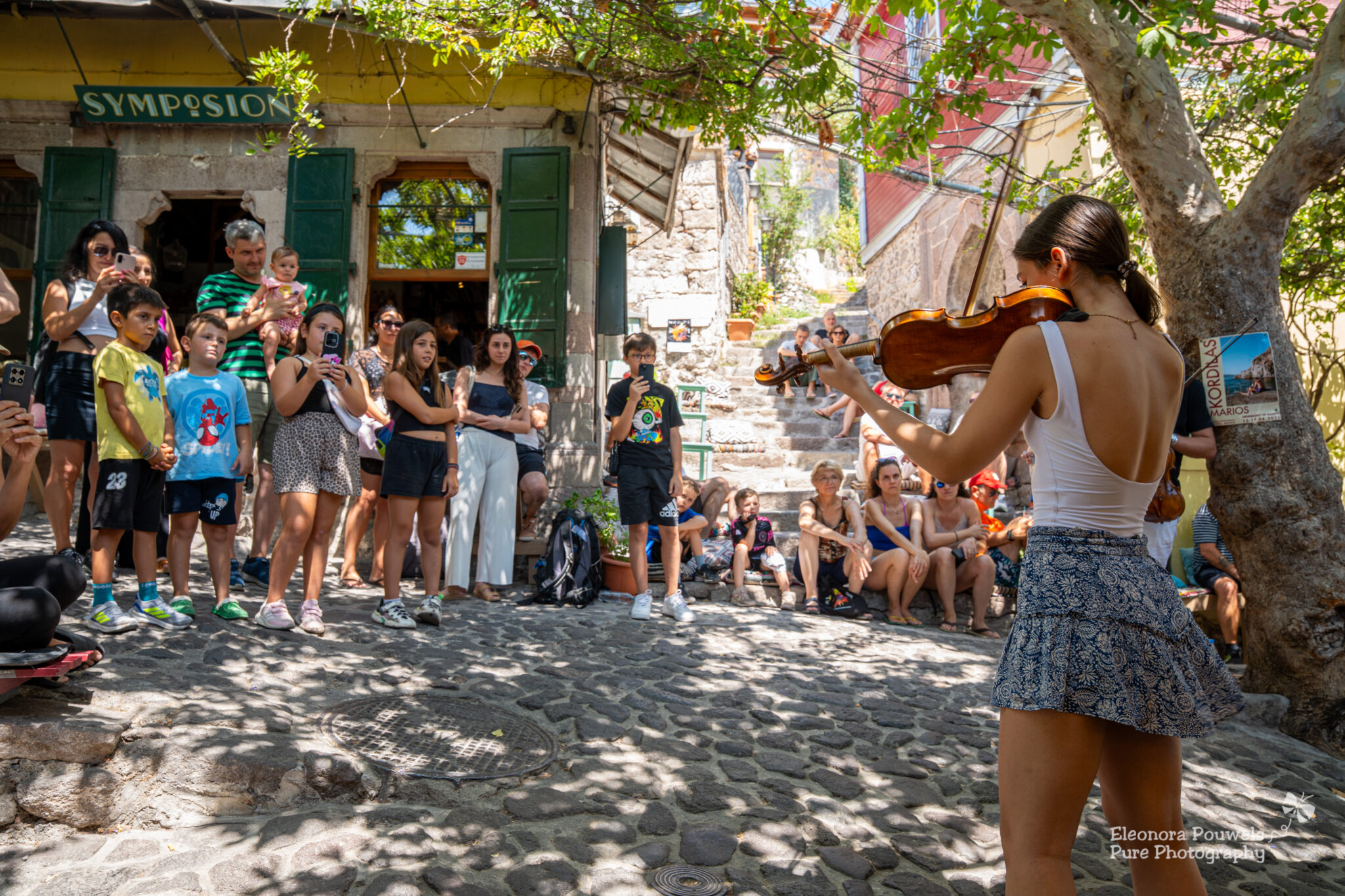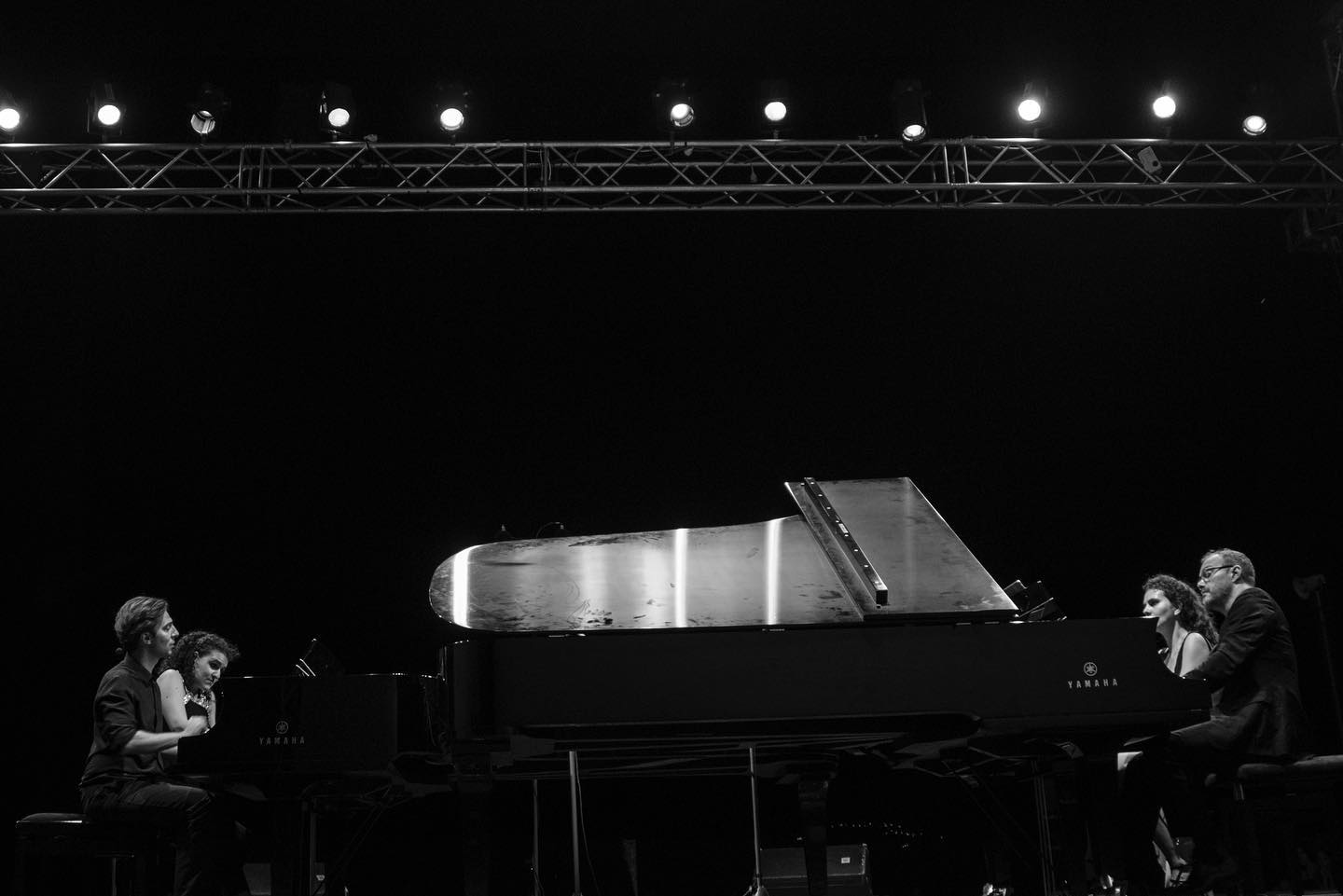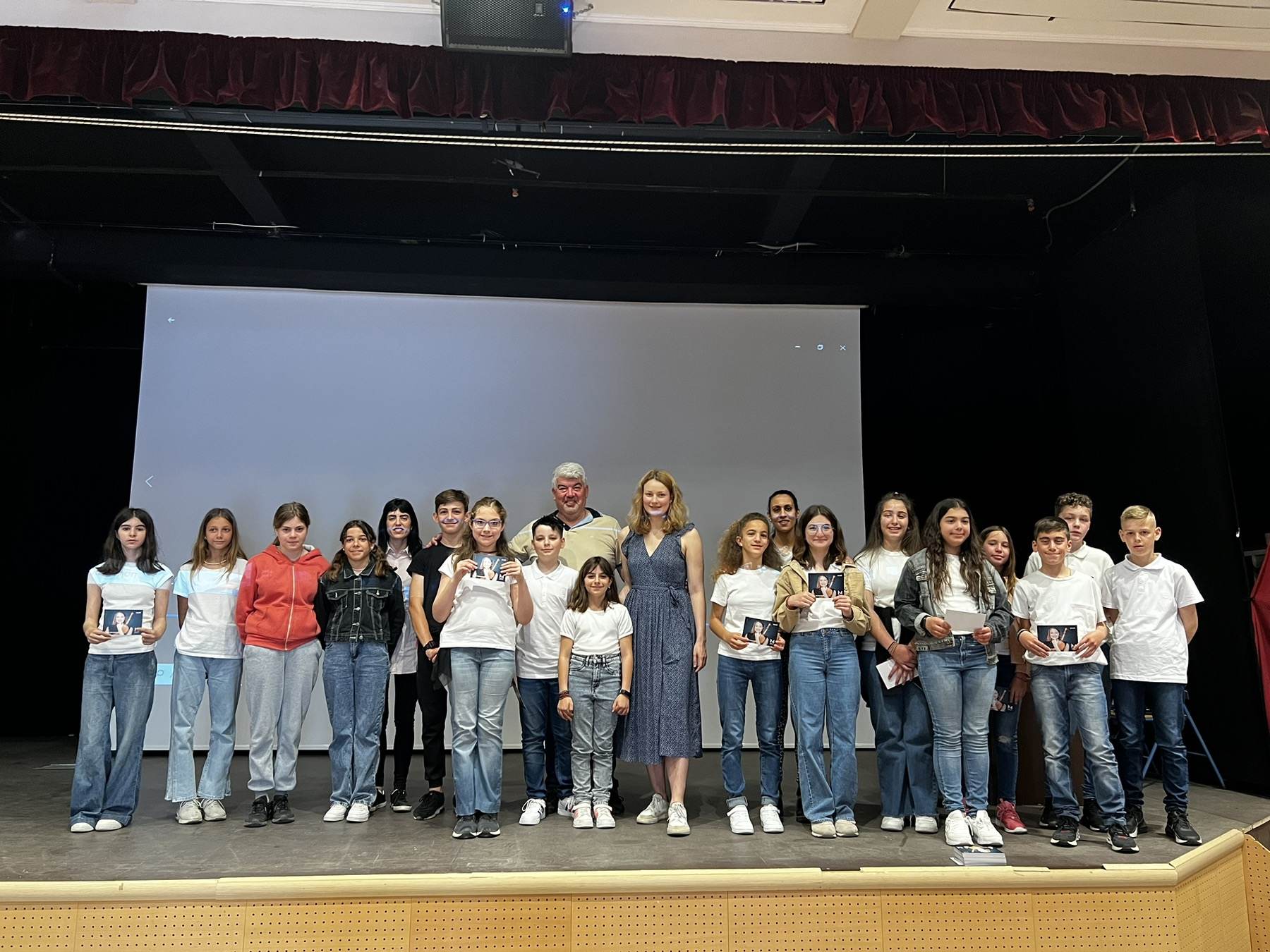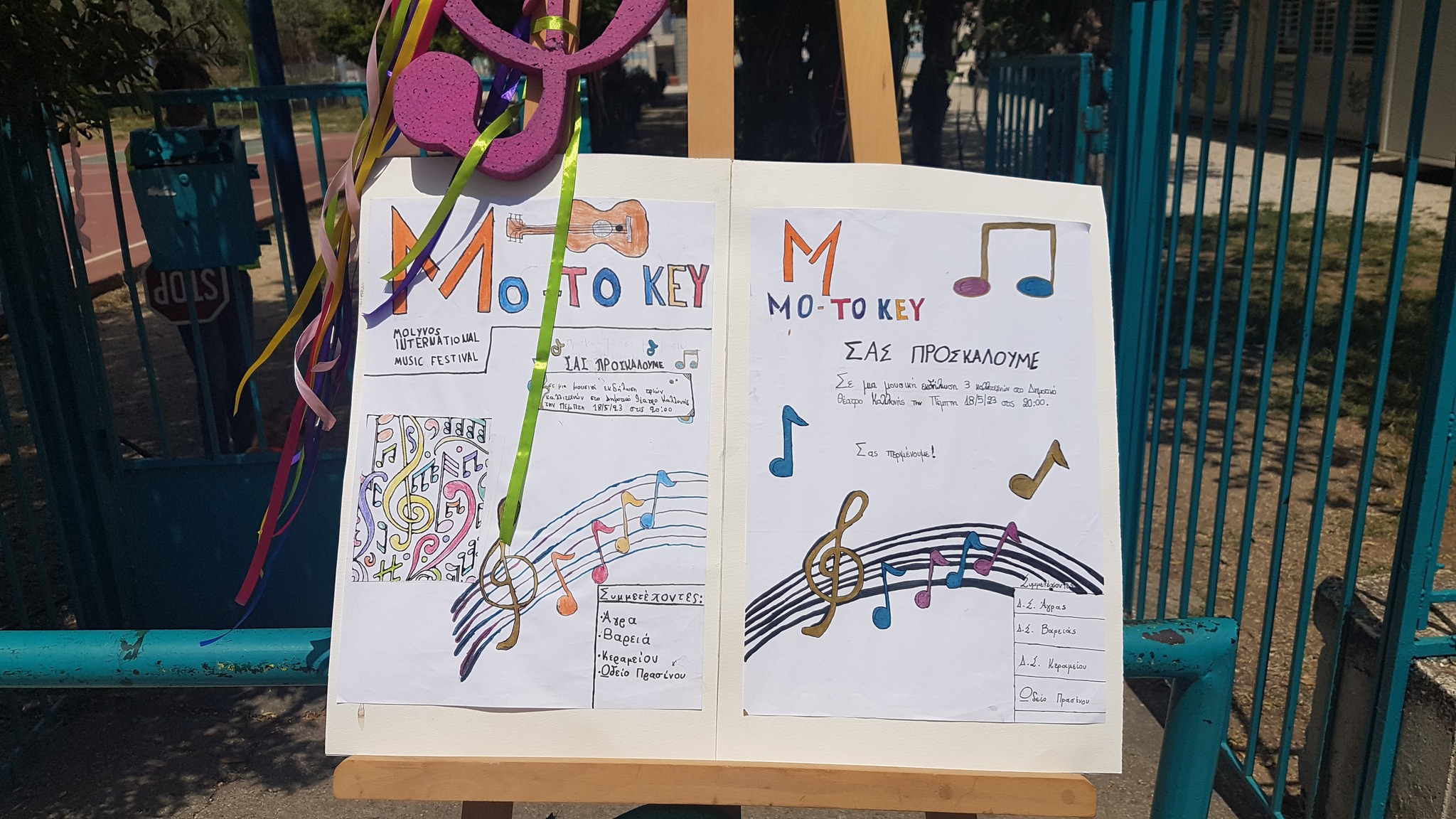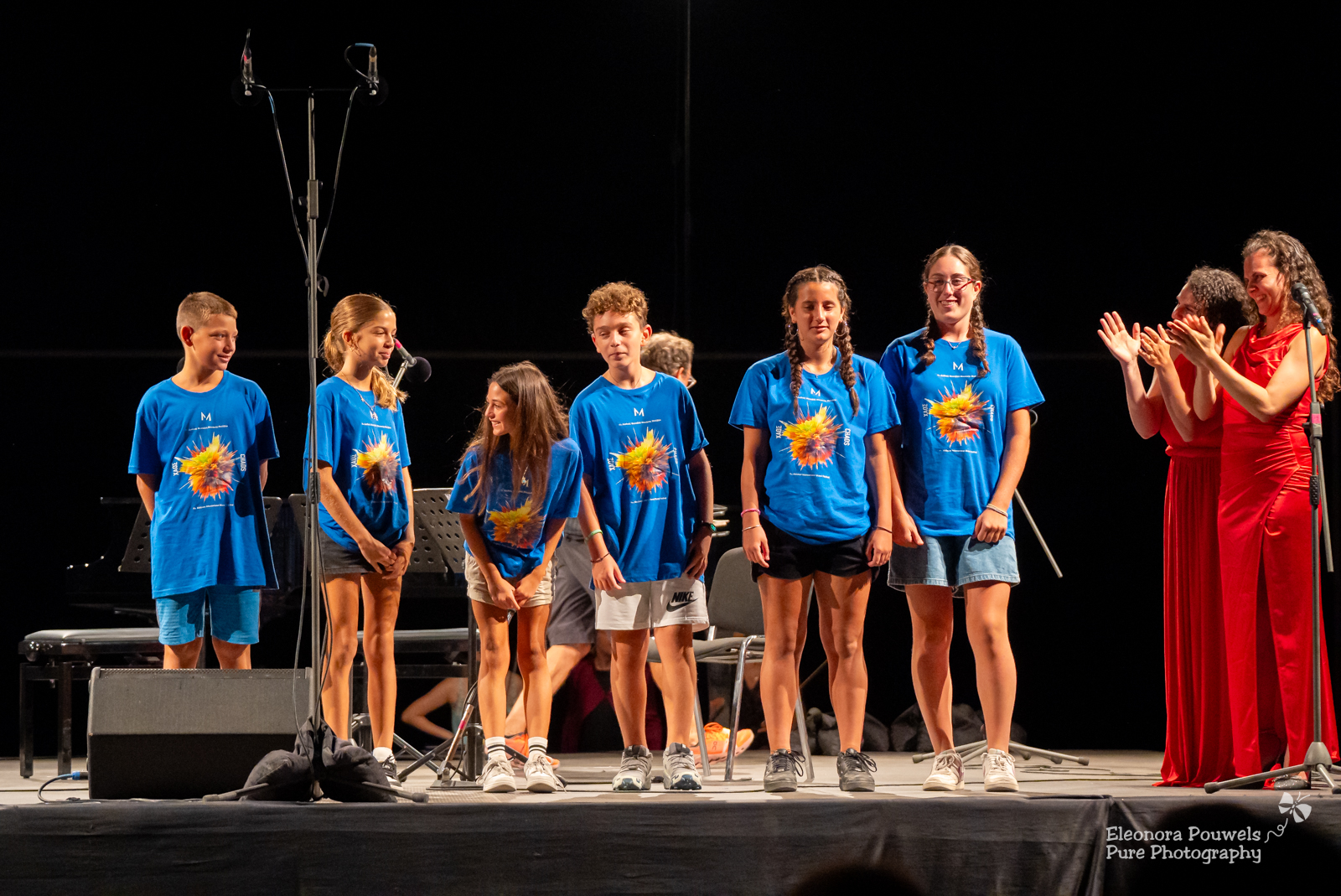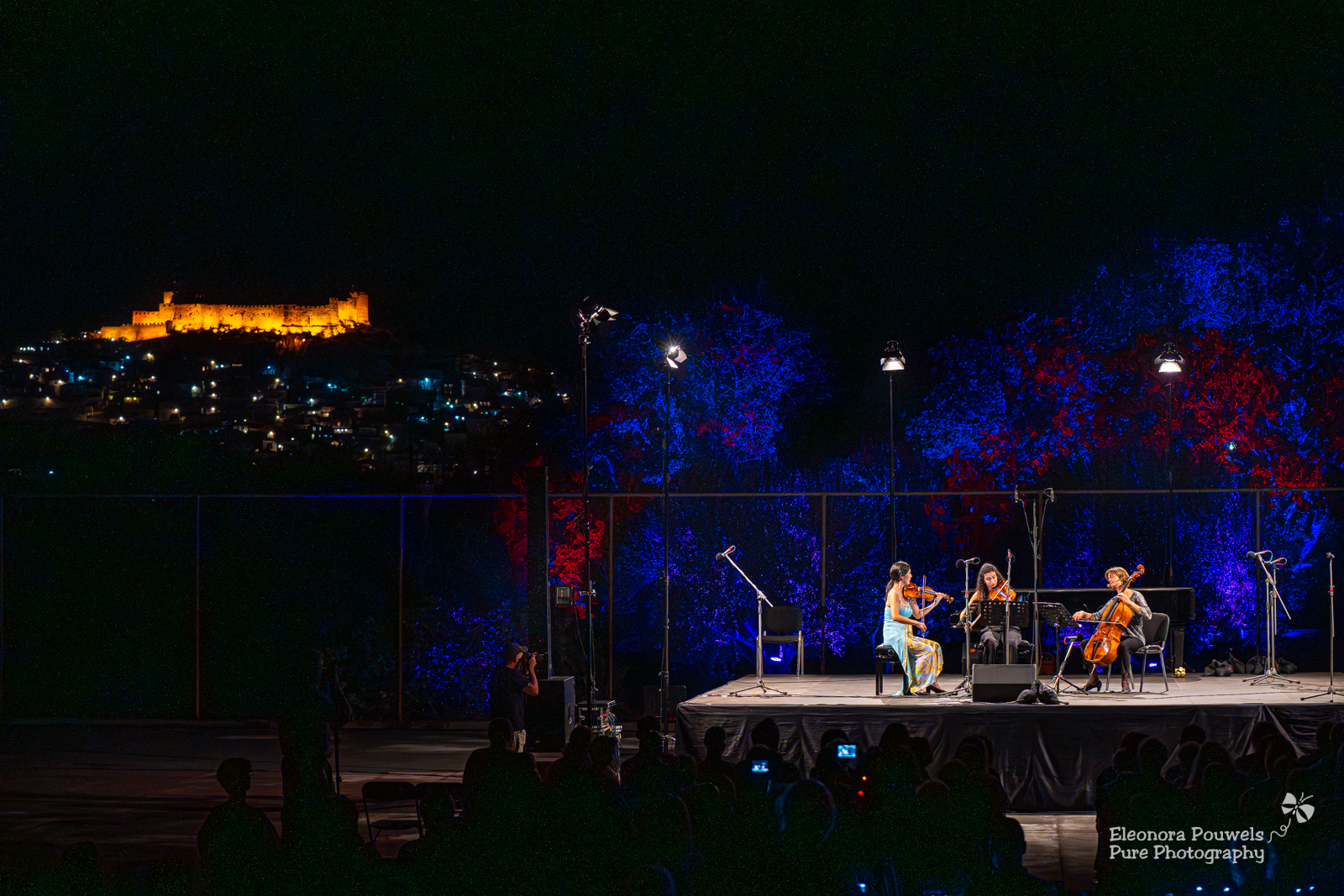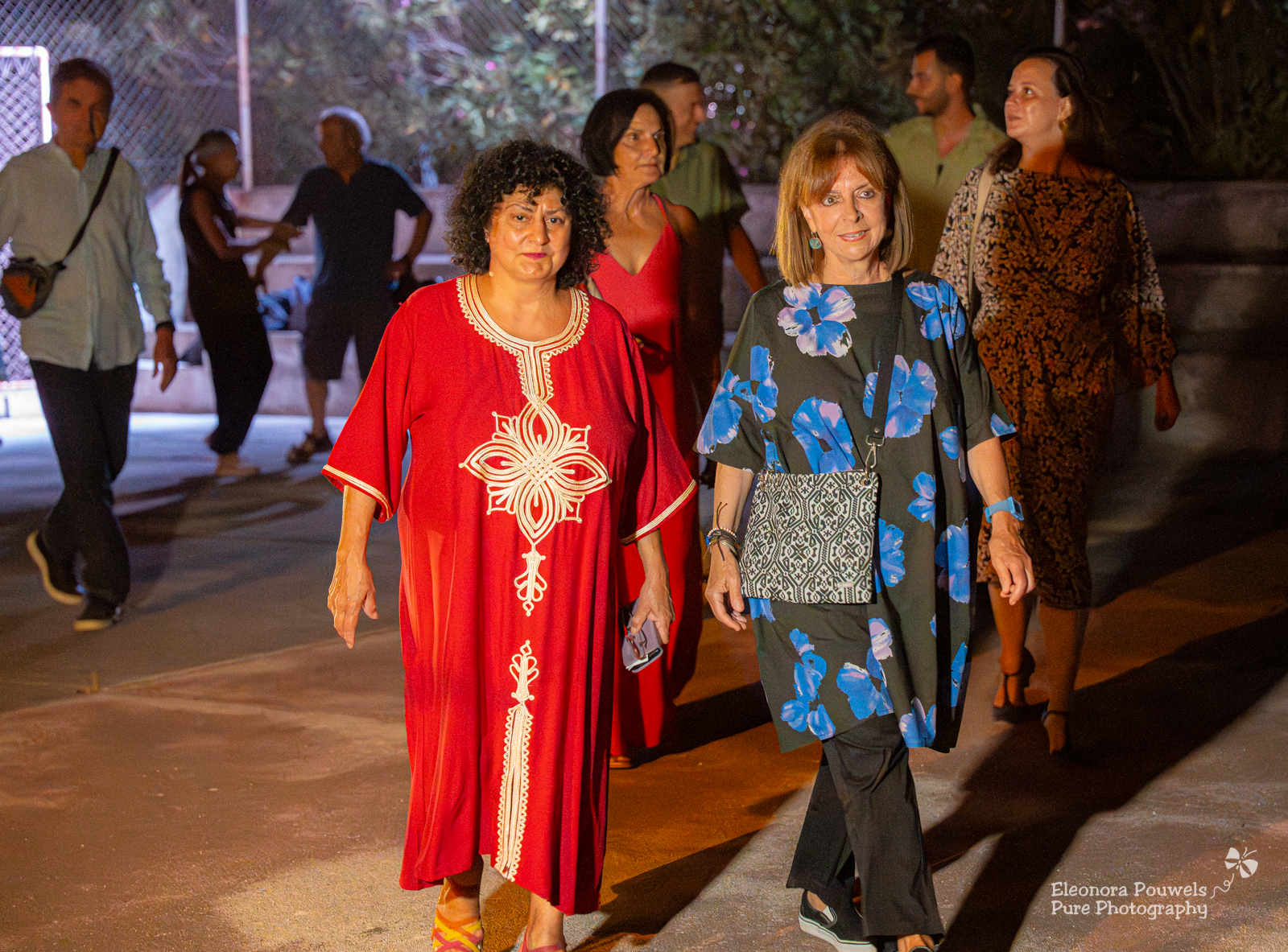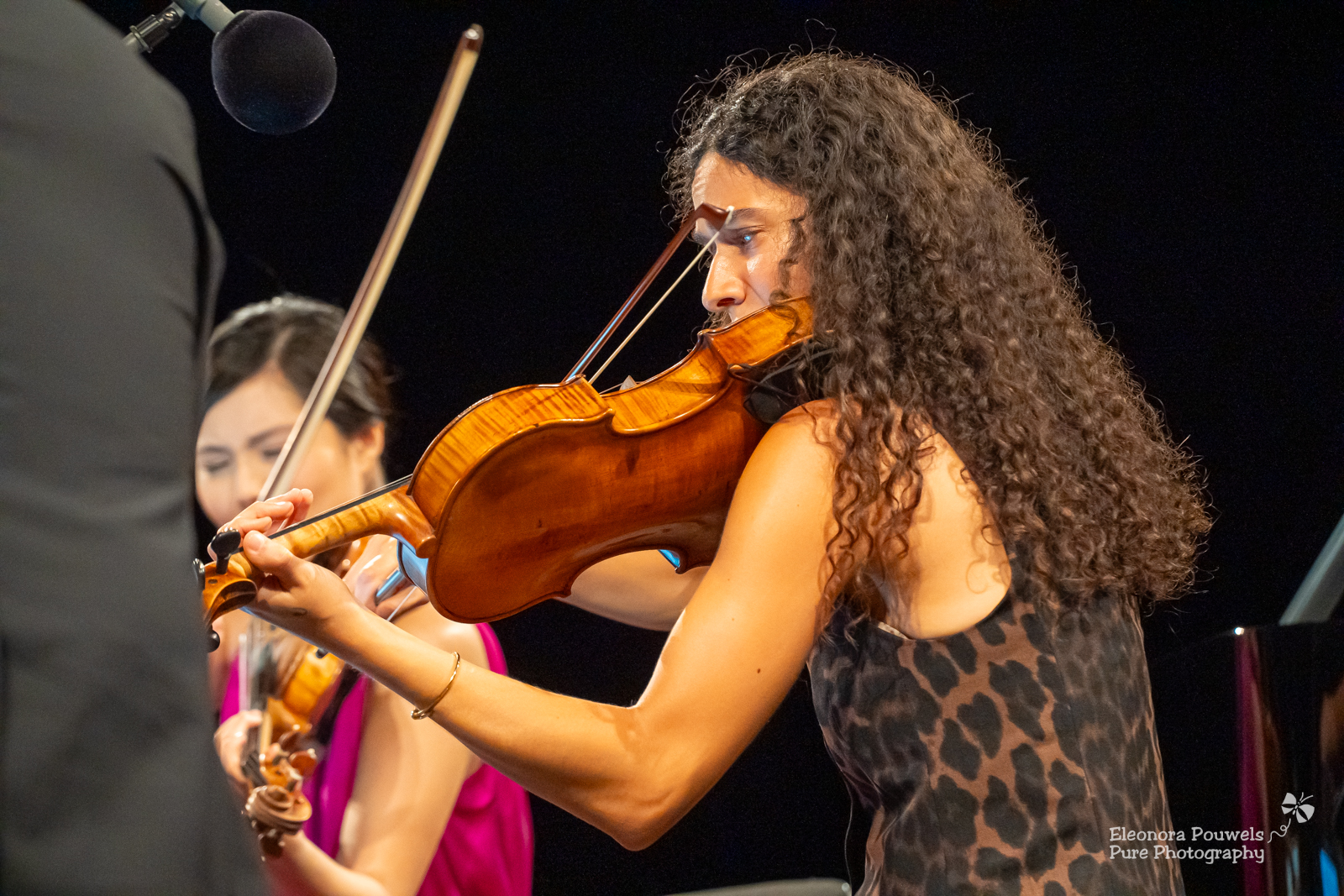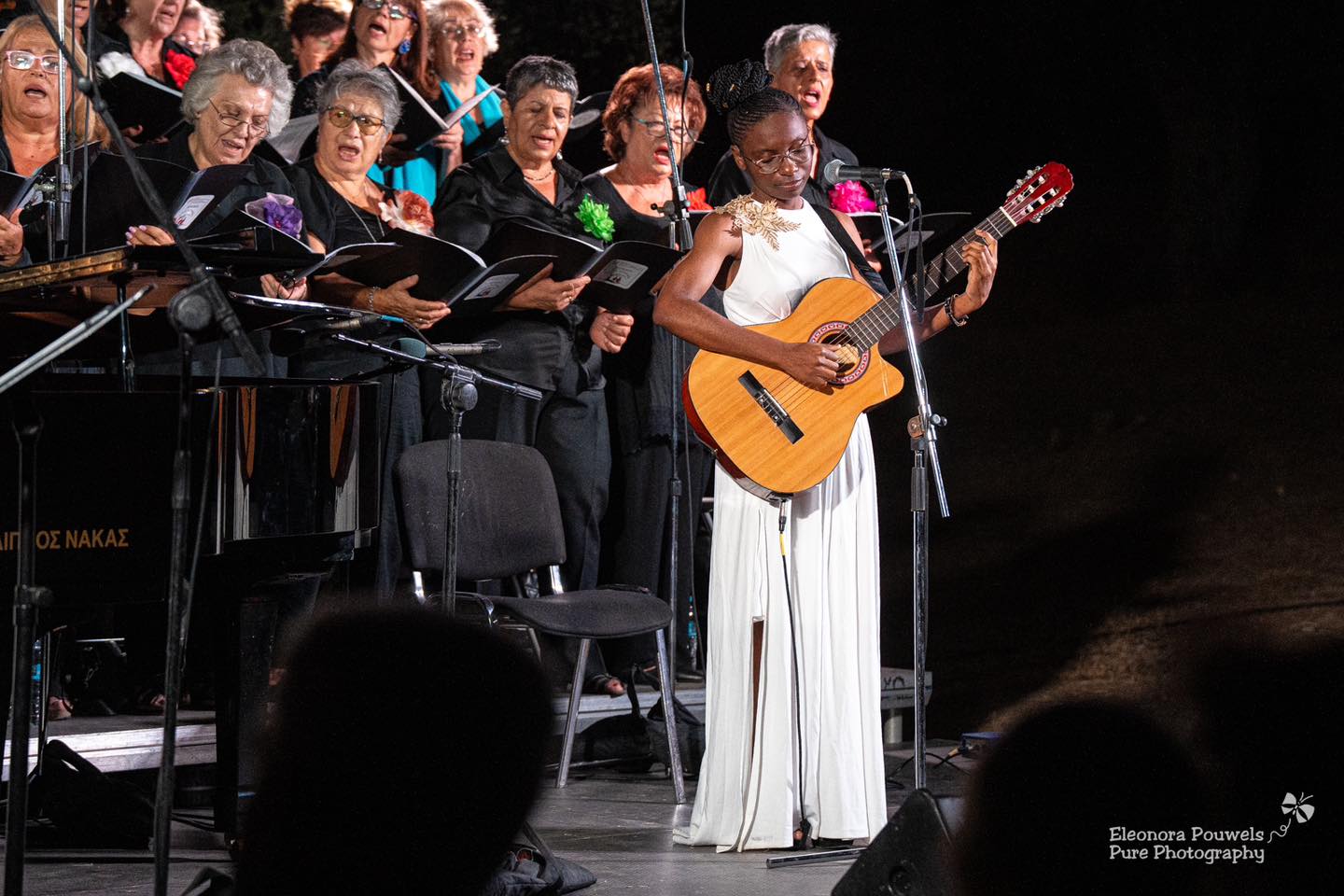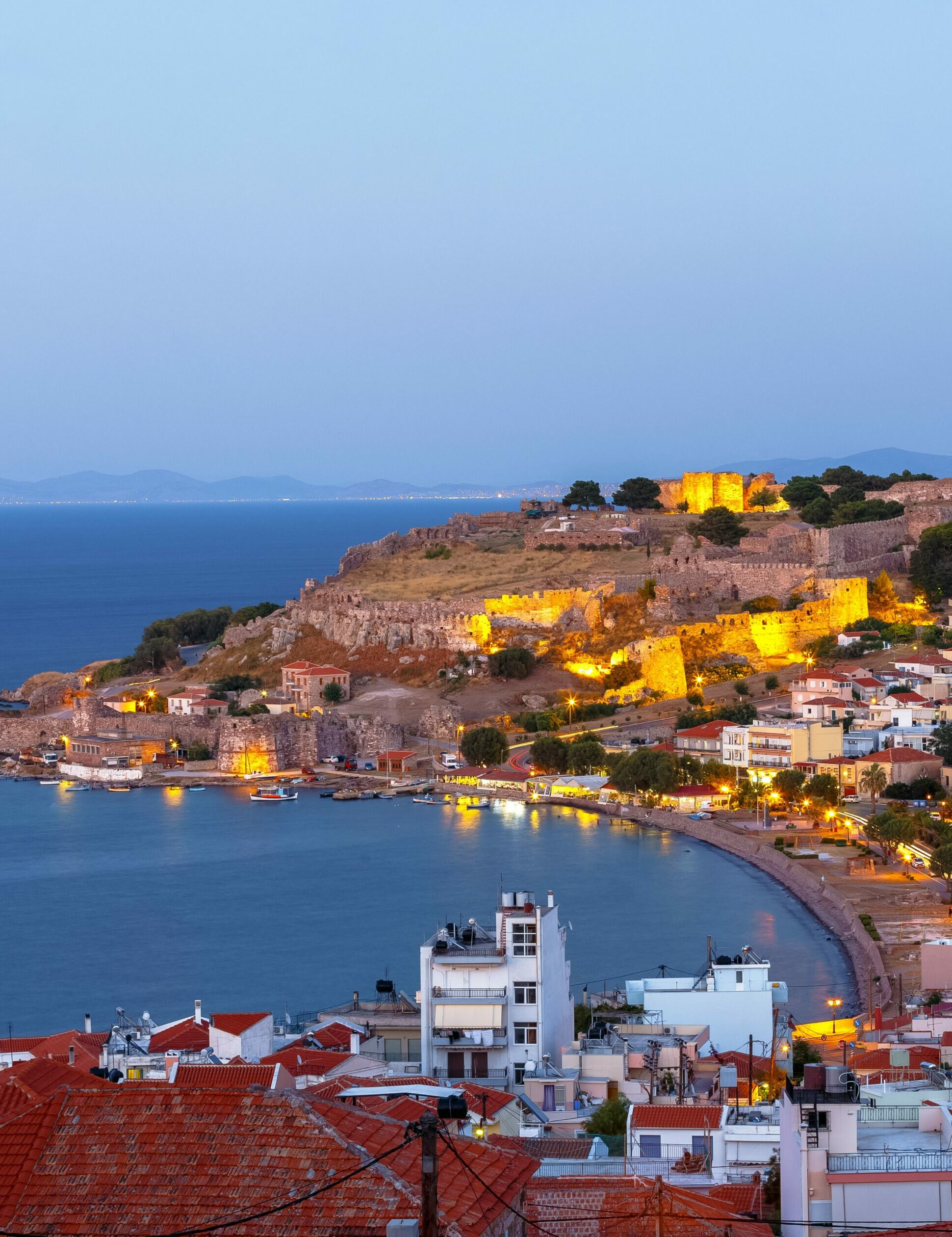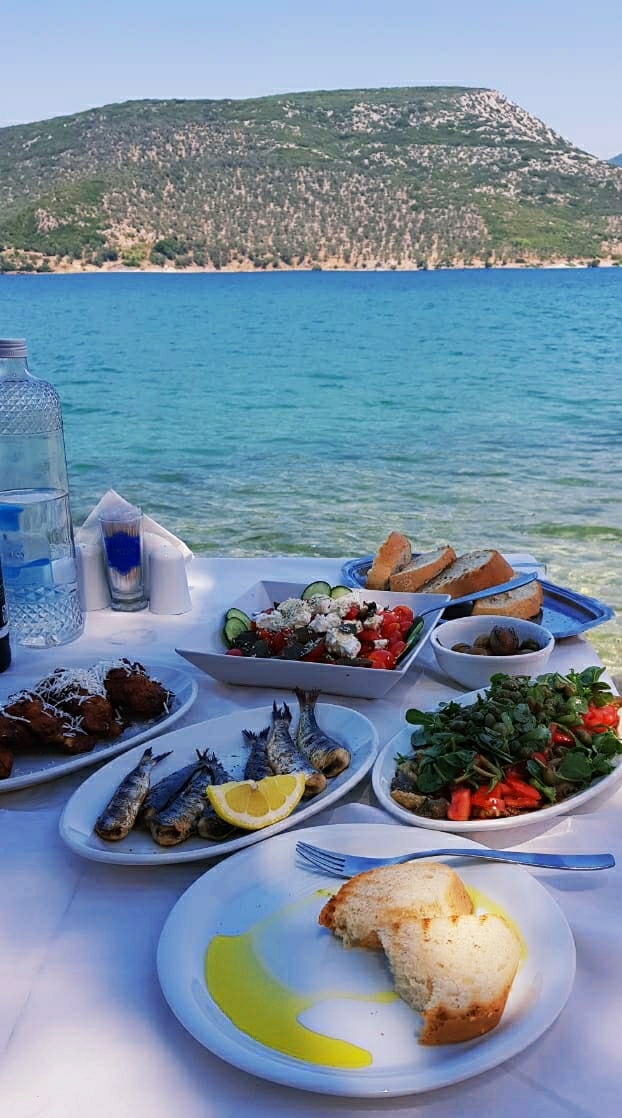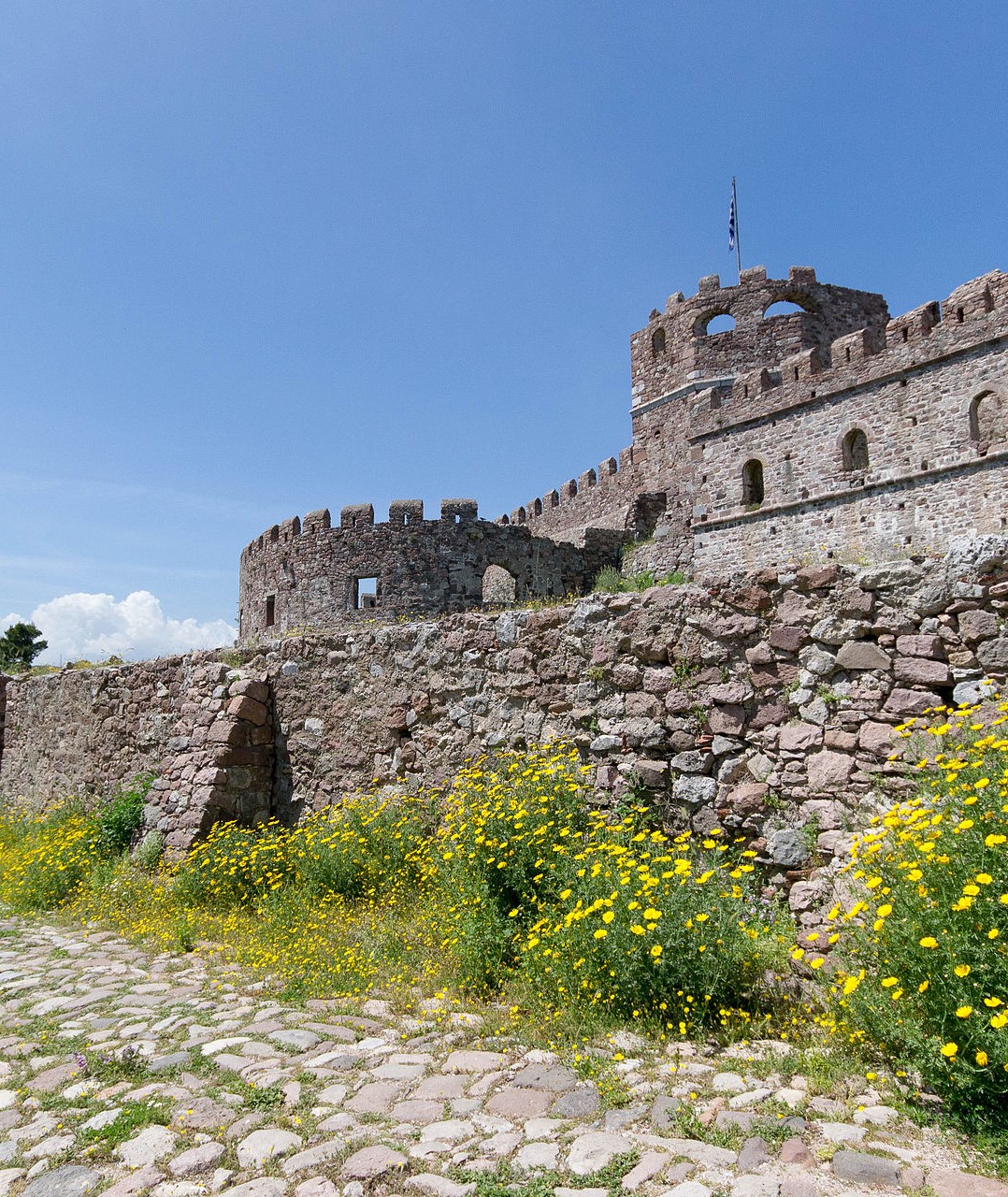At dusk in Molyvos, the sun-soaked Byzantine castle turns molten in the last rays, a survivor standing firmly atop a black, glittering hill of stunningly maintained stone houses and bougainvillea. Below, the Aegean shifts from metallic cobalt to a velvety midnight blue.
Along pretty cobbled lanes, the evening gathers momentum, as ouzo starts to pour, mouthwatering smells waft from taverna kitchens and sunburnt visitors glow. By the seafront, chairs are set for another night of chamber music, the reflective Yamaha grand piano already waiting. When the bow first touches the strings, the sound carries dramatically out across the water.
For one week every August, this village at the northern tip of Lesvos becomes a stage for the Molyvos International Music Festival (MIMF). Now in its 11th year, the unique one week-long event is built on a family story developed by two Greek-German sisters, pianists Danae and Kiveli Dörken, and their mother, economist Lito Dakou. Together with co-founder Dimitris Trifon, they set out in 2015 to bring chamber music of the highest caliber to a place where the landscape thirsted for it.
“Classical music was non-existent on Lesvos, certainly not of the quality we knew from Germany,” Dakou recalls. “We wanted to create something positive, something that could reward the local people, help the economy, and introduce a universal language for all to enjoy.”
The Star Sisters
Danae and Kiveli grew up in Düsseldorf, daughters of a Greek-German family that spent every summer in Molyvos. Music arrived by accident—Danae spotted a piano at a children’s party when she was four, declared she had to learn, and wouldn’t let go until lessons began. “For a whole year, she told me, ‘Mama, I have to learn piano, you’re disappointing me,’” Dakou remembers. “Eventually, we started lessons. And then Kiveli, after hating hours of tennis, also chose piano.”
Both advanced quickly: conservatory training, competitions, invitations to festivals abroad. By their teens, music was a career. By their twenties, it was a life—performances from Berlin to New York, recordings, international recognition. Yet the summers in Molyvos held. Out of that grew the idea that this dramatic corner of Greece, only eight kilometers from Turkey, could also be a place for music of the highest order.
“It was really the idea of the symbiosis between classical music and this location,” the sisters explain. “We wanted to dive deeply into a theme each year, to take people on a journey with us. And from the beginning, the community was open. Maybe because they weren’t routine concert-goers, they were ready to go anywhere with us.”
The Theme: CHAOS
Each year the festival has a theme. For 2025, it was CHAOS: not only alarming events and disorder, especially of the kind the world is experiencing today, but also the state that precedes creation, as according to Greek mythology. As the audience heard, chaos “challenges the human desire for order” while offering the potential for “resolution and harmony.” The week explored that tension with concert titles of Pandemonium, Pain, Opportunity, Rebellion, Hope, and Creation.
“Chaos might not only be something negative,” Kiveli says. “Sometimes it is necessary, because within chaos you can find hope in order to create a new and better reality.” They quoted Aristotle on stage: “When you cannot change the direction the wind comes from, you can adjust the sails.”
One night took the concept to new heights. In Ambeliko, a mountain village of only 52 residents, musicians performed in front of a restored church. Bach’s Chaconne and works by Boulanger, Xenakis, and Rachmaninoff carried across the slopes. The audience filled the square— local residents, global visitors, priests, politicians and goatherds.
“We left thinking, we can be quite certain that Johann Sebastian Bach had never been heard in those mountains before,” Danae says. “That feeling is rare and unforgettable.”
The Musicians, Present
MIMF and its participants staunchly resists the sometimes elitist veneer of classical music performance. The festival is chamber-based: musicians collaborate, shift groups nightly, and walk the same streets as the audience.
You might get a lift home and have a witty chat with spirited violinist Antje Weithaas, or observe cellist Tanja Tetzlaff rehearsing in the shade of a taverna courtyard. At night, they perform in castles and sprawling gardens; afterward, they sit near guests and organizers over plates of the famously tasty local food in an ambiance of uproarious laughter and vibrant conversation.
Post-performance, guests find themselves at long wooden tables hearing stories of life on the road, rehearsal rituals, and personal worlds that rarely surface on stage, as well as meeting writers, music experts, family friends, professors, doctors and diplomats from around the world, all there to be a living part of the whole organism. “What makes the festival unique,” Dakou says, “is the family atmosphere. You see these musicians at Carnegie Hall, but here they are beside you. You can talk to them, share wine, share ideas. We all blend.”
This year’s lineup mixed prominent international names with stellar Greek talent: violinists Weithaas, Florian Donderer, Hyeyoon Park, Kirill Troussov, Katerina Chatzinikolau; violists Georgy Kovalev and Sindy Mohamed; cellists Tetzlaff and Christian-Pierre La Marca. Together with Danae and Kiveli on piano, they effortlessly moved through ensembles—trios, quartets, quintets—that made every night feel electric and strung with creative expression. Every year the festival presents a Young Greek Talent, and this year the audience on the opening night was introduced to 15 year-old violin player Nikolia Garoufalidou.
One of the top highlights was the world premiere of “Preludes for Piano Trio” by Greek composer Errikos Vaios, performed by Chatzinikolau, Tetzlaff, and Danae. Vaios, President of the Hellenic Composers Association, sat with the audience as his work came to life under the stars. With his pianist wife, he attended the entire festival, taking in as much as he was giving out from the enriching experience.
Stage = Place
The eclectic and varied choice of settings defines MIMF. Concerts have taken place all over the island, at places like the under the Castle of Molyvos (currently closed for reparations), the Roman aqueduct of Moria, scenic village squares, and seafront lawns. Each site reshapes the music. The view from the castle is heartening, with the red rooftops contrasting against the blue Aegean Sea and the colours of the olive trees. It’s worth visiting just before sunset to get the best out of the spectacle.
At the Delfinia Hotel’s seaside park, audiences watch as the sun drops, the castle beams in gold above, and the sea darkens behind. At Ambeliko, stone and mountain framed the sound. At the aqueduct, Bartók and Beethoven echoed through arches built in Roman times.

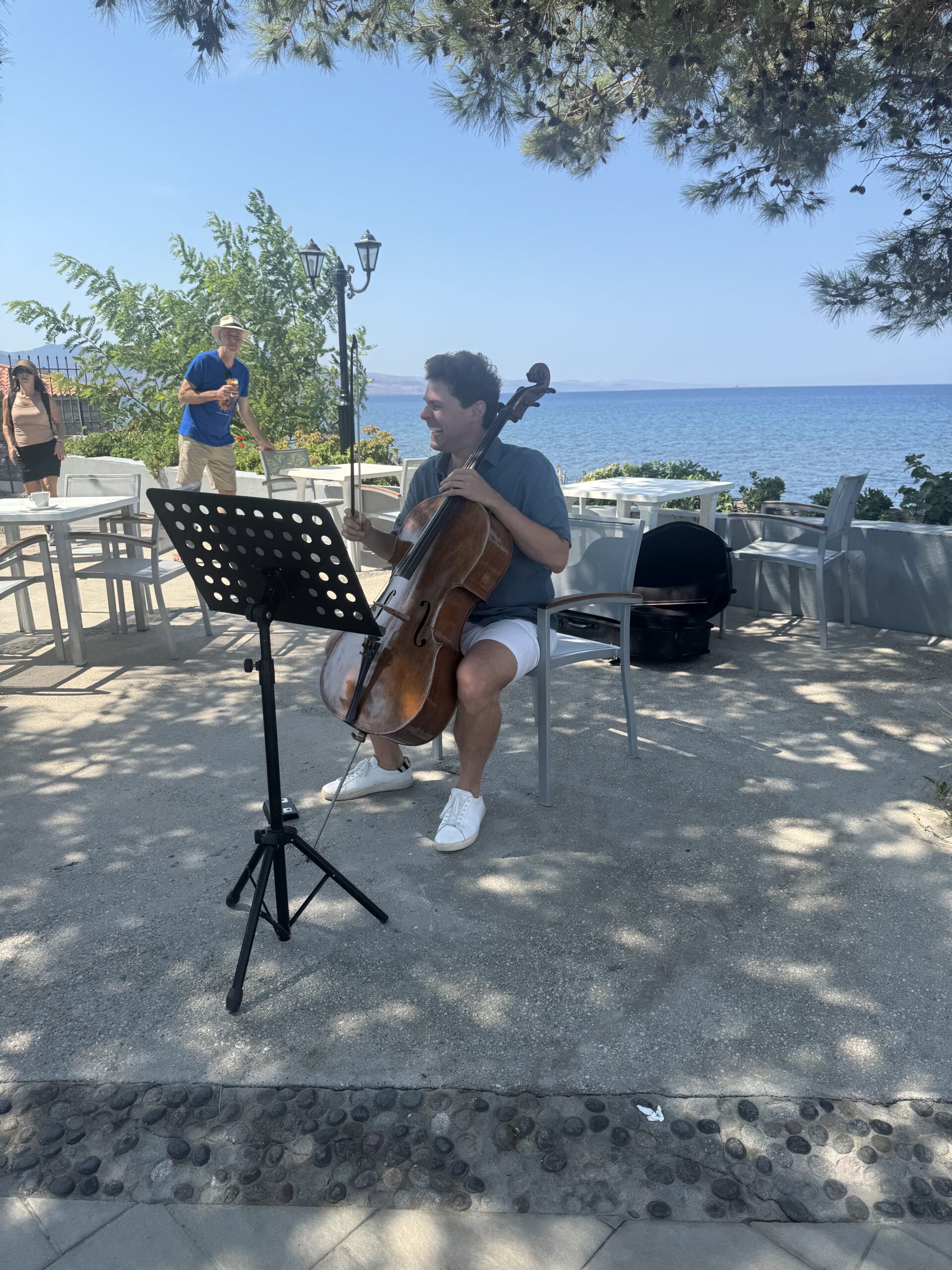
Music also pours into daily life through Molyvos Musical Moments—free performances held in winding lanes, by the beach, in taverna courtyards, even by a swimming pool. Locals and tourists who never thought classical music was for them take in the music, and often end up attending the evening concerts, where the one third of seating is free of charge.
“You don’t need to know the opuses of Mozart or Beethoven. You just need an open heart,” Dakou emphasizes. Indeed, as we traipse through the village together she is repeatedly stopped by the likes of policemen, teachers, shop-owners, mothers coddling babies and congratulated for the impressive shows or asked for tickets.
The Kit
The intimacy might feel spontaneous, but behind it lies rigorous craft. The festival insists on standards equal to Berlin or Vienna. The concert grand piano is a Yamaha CFX, shipped from Athens each summer, maneuvered into castles and courtyards with specialized equipment.
Sound quality is equally perfectionist: Schoeps microphones supplied annually, and Berlin engineer Kaspar Wollheim, formerly of RBB, shaping the acoustics. The result: you hear the inner line of a viola without losing the salt air in the mix.
The Bigger Vision
The festival was born in a difficult year. In 2015, Greece was under capital controls; Lesvos was soon at the center of the refugee crisis; later came the pandemic. “When everyone else was closing, we were opening,” Dakou remarks. The sisters, then barely into their twenties, kept steering.
Their aim was never only the one week festival. From the start, they wanted education and exchange. MIMF runs programs in schools across the year with German partner Tonali, teaching children not just music but cultural management: how to organize, host, promote, and create a concert. Students finish with a diploma—and the experience of welcoming international artists themselves.
“Children can change the world,” Dakou says simply. On the last night of the performance, a proud gang of kid volunteers graced the stage receiving a hefty applause.
Keeping It Alive
Behind the music is constant fundraising. The festival is supported by the Association of Friends of MIMF Düsseldorf, chaired by Dr. Henning Stein, with members across Germany and beyond. Sponsors include Yamaha and Schoeps. Germany-based Schimmer PR, which represents leading international artists, amplifies the festival’s story abroad, while Greece-based Natalia Katifori is responsible for their PR in Greece. “We’ve seen over eleven years that the local community—and not just Molyvos, but all of Lesvos—waits for this event,” Stein says. “It has created pride, culture, and even economic growth in ways none of us could have predicted.”
Still, it’s fragile. “The weak point is money,” Dakou admits. “The Ministry of Culture gives what it can, but local authorities could do much more.” The festival survives on dedication, sponsors, and the belief that quality art has a ripple effect—cultural and economic—that goes far beyond ticket sales. Click here to see how you can offer your support.
Good Morning, Molyvos!
Every morning of the festival week, the village awakes to an announcement. From the basement of the Molyvos Municipality building, Dakou takes the microphone of the Doudouka, the old loudspeaker system, and boldly, yet warmly announces “Good Morning Molyvos! Come to our concert tonight at the Molyvos Music Festival! We are waiting for you!”
It’s become a ritual: children snigger, old ladies smile, tourists put down their smartphone to prick up their ears for the information.
What It Leaves Behind
Eleven years on, MIMF has become part of the identity of Molyvos. Audience members loyally return, locals take pride, children grow up with Bach in their ears, world-class mucicians experience a unique working holiday. The festival has weathered crises and yet keeps expanding its circle, from village squares to mountain sanctuaries. “If you don’t come and feel the atmosphere yourself—the sea air, the castle, the musicians among the people—you can’t imagine it,” Stein says. “Videos or Instagram posts don’t capture it. The magic here is something else.”
Its essence remains simple: chamber music of the highest quality, shared directly with people, in one of the most striking settings in the Northern Aegean. “If you want a life-changing experience,” Dakou says, “come with an open mind. Sit here through the week, from alpha to omega. You might just be transformed.”
I know that I certainly was. I found myself waking up every day eager to feel my soul nourished with sound that I knew I loved, but didn’t know just how much I needed. Especially in such a chaotic world. Leaving the island I felt that this daily diet of sublimely performed music, amazing sunset swims in the cool sea, glittering sky and castle vistas, famously delectable Lesbian cuisine, copious amounts of refreshing wine spritzers and mind-opening conversations with musicians, guests and organizers, created a change in me that I wouldn’t want to go back from ever again.
Photos by Eleonora Pouwels Pure Photography



